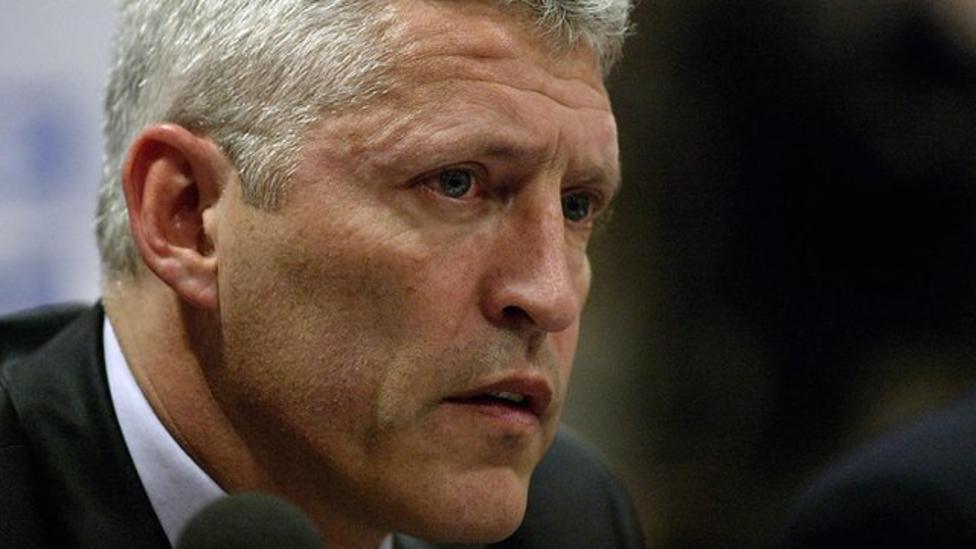Football gambling links 'gone too far', ex-FA boss says
- Published

Most clubs in the top two tiers of English football are sponsored by gambling companies
Former FA chief executive Mark Palios says football needs to "wean" itself off gambling sponsorship.
He told BBC Radio 4's File on 4 programme football's links with the betting industry had gone "too far".
Mr Palios, who chairs Tranmere Rovers FC, said he would not accept gambling sponsorship and had rejected an offer from a major betting company last year.
The English Football League said football and the gambling industry worked together responsibly.
A spokesman said: "The EFL itself continues to have a successful relationship with Sky Bet who, as a responsible, properly regulated bookmaker, recognise the importance of having the right safeguards in place. "
Any marketing of the partnership promoted best practice and protected minors and the vulnerable, he added.
The Premier League said it did not have a central gambling partner and sponsorship deals were up to individual clubs.
In the top two tiers of English football, nearly 60% of clubs are signed up to sponsorship agreements with gambling companies.

Mr Palios has helped a number of players with gambling problems
Mr Palios said the offer he had rejected had included a plan to place betting terminals inside the ground.
"This is a family club that's firmly rooted in the community and from our perspective it's the wrong thing to do to get associated with the gambling industry," he said.
"We can't change the bigger picture in terms of the football industry being involved to the extent it is but from a personal perspective that's what we do.
"Football has to wean itself off the position it is in at the moment - and that's the best verb I can use.
"It's certainly gone too far."
Mr Palios played as a midfielder for Tranmere Rovers for nine years and Crewe Alexandra for three years.
He was made chief executive of the Football Association in July 2003.
But he resigned in August 2004, following newspaper allegations concerning the then England coach Sven-Goran Eriksson's affair with former FA secretary Faria Alam.
Ten years later, he took a controlling interest in Tranmere Rovers and became chief executive.
'Pernicious'
Mr Palios also revealed an employee had stolen from the club to feed their gambling addiction and he had helped a number of players there with gambling problems.
He said the demographic of a football club was "particularly appealing" to gambling operators.
Mr Palios also highlighted a report suggesting most of the betting shops in Wirral - where EFL League One team Tranmere are based - were in the poorest areas, where people spent more than twice as much on gambling as those in the richest areas.
"I see gambling as something that is pernicious. People get hooked into it and it is a hidden addiction," he said.
"You see people stealing from their employers as we've seen and it destroys relationships and fundamentally damages family units and family units are a massive part of the community."
Voluntary ban
The Betting and Gaming Council, which represents most bookmakers in the UK, said it was "considering" a voluntary ban on football shirt sponsorship and pitch-side advertising.
And last month, the Gambling Commission, the industry regulator, said it was investigating a deal in which FA Cup matches had been shown live via seven betting sites if potential customers had signed up for an account.
The FA said: "We made a clear decision on the FA's relationship with gambling companies, in June 2017, when we ended our partnership with Ladbrokes.
"The leagues and clubs govern their own relationships with gambling companies."
File on 4's Fair Game?: The Secrets of Football Betting is on BBC Radio 4 on Tuesday 18 February at 20:00 and available afterwards on BBC Sounds.
- Attribution
- Published31 January 2020

- Attribution
- Published10 January 2020

- Published16 January 2020
